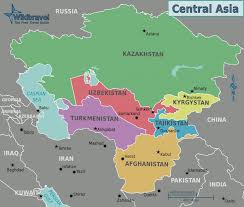 CORROSIVE corruption, submissive courts, poverty lapping at the gates of presidential palaces: the parallels between the regimes of Central Asia's autocrats and that of the fallen Ukrainian president, Viktor Yanukovych, are uncomfortably plain. Events in Ukraine pose two worries for the ageing strongmen of Central Asia.
CORROSIVE corruption, submissive courts, poverty lapping at the gates of presidential palaces: the parallels between the regimes of Central Asia's autocrats and that of the fallen Ukrainian president, Viktor Yanukovych, are uncomfortably plain. Events in Ukraine pose two worries for the ageing strongmen of Central Asia.
First, the success of anti-government protests in Kiev, Ukraine's capital, that toppled Mr Yanukovych might serve as inspiration for revolutions in Central Asia. Second, the rulers realise, the response of President Vladimir Putin of Russia in seizing Crimea could be seen as a blueprint for future Russian invasions. All five of the post-Soviet states of Central Asia have their own populations of ethnic Russians. These minorities have long felt more marginalised than those who now enjoy Mr Putin's "protection" in Crimea.
Russia also has a big military presence in Central Asia. Kazakhstan is host to Russia's Baikonur Cosmodrome and several military training facilities. Kyrgyzstan has a Russian air base. And Tajikistan is home to some 7,000 Russian troops—Moscow's largest land force outside the motherland.
In public, most of Central Asia's rulers have said almost nothing about events in Ukraine. Theirs is a delicate balancing act. They wish neither to encourage secessionism at home nor to alienate Russia, with its immense economic leverage. As a political analyst in Tajikistan, Parviz Mullojanov, says, for Russia to promote secessionism is dangerous for Central Asian countries—"They know they could be next". Days after Russian troops occupied Crimea, Uzbekistan expressed anxiety about Ukraine's "sovereignty and territorial integrity". Kazakhstan said it was "deeply concerned" about "unpredictable consequences". Tajikistan called vaguely for an "objective assessment". Kyrgyzstan broke ranks on March 11th, condemning "acts aimed at destabilising" Ukraine.
It did not mention Russia by name. Indeed, the media in these countries hardly cover the crisis at all. Yet to the authorities' mounting alarm, Russia is drafting legislation extending eligibility for citizenship to Russian-speakers anywhere in the former Soviet Union. It would explicitly entitle them to extraterritorial protection.
Mr Putin's vision, to which the Crimean grab gives a nod, is to build a rival to the European Union. His Eurasian Economic Union is intended to be a group of authoritarian former Soviet republics that reject Western liberalism.
Two have already signed up, Belarus and Kazakhstan. Armenia and impoverished Kyrgyzstan, with a pro-Russian government established after a popular revolution in 2010, are negotiating entry. Tajikistan, which like Kyrgyzstan is heavily dependent on remittances earned in Russia, has expressed interest. But without reasserting Russian influence in Ukraine, so important in economic and geopolitical terms, Mr Putin will never be able to realise this grand ambition.
Oil-rich Kazakhstan exemplifies the region's vulnerabilities. A founding member of the customs union, its economy is tied closely to Russia's. On March 5th Mr Putin summoned the Kazakhstani president, Nursultan Nazarbayev, along with the president of Belarus, and told them that the Ukraine crisis risked hurting their economic bloc.
Mr Nazarbayev's country has a large Russian population, concentrated along its 6,800-kilometre (4,250-mile) border with Russia. Russian nationalists sometimes mutter that these areas belong with Russia. If Mr Putin were asked to rescue ethnic Russians, might he amputate a bit of Kazakhstan? Mr Nazarbayev is taking no chances. After his visit to the Kremlin he ordered his army to be built up. But he is walking a fine, even awkward, line, saying on March 10th that he "understands" Mr Putin's need to meddle in Ukraine.
In the poorer parts of Central Asia Mr Putin has even more clout. He could destroy the economies of Kyrgyzstan, Tajikistan and Uzbekistan by requiring visas for migrant workers, whose remittances contribute greatly to their home countries' GNP—almost half in the case of Tajikistan. The interdependence of these economies was evident on the first business day after the appearance of Russian troops in Crimea. Not only did Russian markets and the rouble tumble; the Kyrgyz som plunged by 15% before recovering a bit.
By contrast, Russia has less influence over gas-rich Turkmenistan. Russia has long been irked by the Turkmen government's treatment of ethnic Russians there. Might they call for protection too? Perhaps, though it looks unlikely that Mr Putin would suddenly resort to military intervention in Central Asia. Among other things, in most of the region he has enough influence without it.
But the case of Crimea has shown that Mr Putin does not need much of a pretext to justify intervention when it suits him. The leaders of Kazakhstan and Uzbekistan are well into their 70s, but have not revealed any plans, if indeed they have them, for their succession. If chaos were to follow their deaths, that might be when Mr Putin takes the view that local Russian-speakers are in need of his protection.




